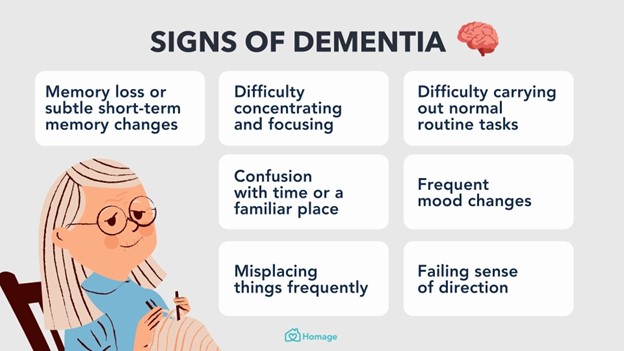A community health nurse is providing teaching to the family of a client who has dementia. Which of the following manifestations should the nurse tell the family to expect?
Decreased display of emotions
Forgetfulness gradually progressing to disorientation
Personality traits that are opposite of original traits
Decreased auditory and visual acuity
The Correct Answer is B
A) Decreased display of emotions:
While changes in emotional expression can occur in individuals with dementia, it's not a primary manifestation that is typically emphasized when educating families. Behavioral and psychological symptoms, including changes in emotion and personality, can be seen in dementia, but forgetfulness progressing to disorientation is a more direct and characteristic symptom of the condition.
B) Forgetfulness gradually progressing to disorientation
Explanation:
When educating the family of a client with dementia, the nurse should inform them to expect forgetfulness that gradually progresses to disorientation. Dementia is a progressive cognitive decline that affects memory, thinking, and reasoning. Forgetfulness is often one of the initial symptoms of dementia, and as the condition advances, individuals can become disoriented to time, place, and even people. This progression occurs due to the degeneration of brain cells and the accumulation of abnormal proteins.
C) Personality traits that are opposite of original traits:
Changes in personality traits can indeed occur as a result of dementia, but this may not be the most prominent or early manifestation that the nurse would want to highlight when educating the family. The gradual progression of forgetfulness leading to disorientation is a more specific and foundational aspect of dementia.
D) Decreased auditory and visual acuity:
Decreased sensory acuity, such as auditory and visual acuity, can happen with age and various health conditions, but they are not primary manifestations of dementia. Dementia primarily affects cognitive functions like memory, thinking, and reasoning.

Nursing Test Bank
Naxlex Comprehensive Predictor Exams
Related Questions
Correct Answer is ["1.5"]
Explanation
To calculate the number of clozapine 200 mg tablets needed to administer a total of 300 mg, divide the total dose by the dose per tablet:
300 mg / 200 mg = 1.5 tablets
Since you cannot administer half of a tablet, you would need to administer 2 tablets to achieve a total of 300 mg.
So, the nurse should administer 2 tablets of clozapine 200 mg each to achieve a total dose of 300 mg.

Correct Answer is C
Explanation
A. Explain to the client that the behavior was unacceptable: While addressing the behavior is important, it is more effective to first establish clear limits and boundaries to prevent further incidents.
B. Explore the truth of the client’s statements: This step involves assessing the client's statements and understanding their perspective, which is important but can be done after setting behavioral limits.
C. Set behavioral limits for the client: Establishing clear behavioral limits is crucial for maintaining safety and order in the psychiatric unit. It helps ensure that the client understands what is expected of them and the consequences of unacceptable behavior. This is particularly important if the client has exhibited aggressive behavior, as it helps prevent further incidents and maintains a safe environment for everyone.
D. Establish a client relationship: Building a therapeutic relationship is essential for effective treatment, but it should be done in the context of a safe environment where clear behavioral expectations have already been established.
Whether you are a student looking to ace your exams or a practicing nurse seeking to enhance your expertise , our nursing education contents will empower you with the confidence and competence to make a difference in the lives of patients and become a respected leader in the healthcare field.
Visit Naxlex, invest in your future and unlock endless possibilities with our unparalleled nursing education contents today
Report Wrong Answer on the Current Question
Do you disagree with the answer? If yes, what is your expected answer? Explain.
Kindly be descriptive with the issue you are facing.
